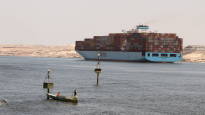The reason for the new route is the Houthi rebels operating in Yemen and supported by Iran, who have attacked ships in the Red Sea.
The Danish shipping company Maersk announced on Tuesday that its container ships will start going around Africa via Hyväntoivonniemi instead of the Suez Canal, reports news agency Reuters.
The reason for the new route is the Houthi rebels operating in Yemen and supported by Iran, who have attacked ships in the Red Sea. Tensions have increased in the region since the extremist organization Hamas attacked Israel in early October and Israel began countermeasures in Gaza.
The Suez Canal, which connects the Mediterranean and the Red Sea, is one of the world’s busiest maritime traffic lanes. 12 percent of international shipping passes through it.
The Maersk container ship was hit by a missile last Thursday on its way from Salalah, Oman to Jeddah, Saudi Arabia. However, according to Maersk, the attack was not successful.
– Attacks on commercial ships are alarming and pose a significant threat to the safety of seafarers, Maersk said in a statement CNBCfor.
On Monday evening, Maersk had a couple of dozen vessels docked in the Gulf of Aden and on both sides of the Suez Canal. According to the company, the detour route will be put into use as soon as it is operationally possible.
The German cargo shipping company Hapag-Loyd has also announced that it will start a tour around Africa. Swedish Electrolux says it is considering alternative routes for its deliveries. Electrolux has cooperated with Maersk and the French CMA.
In addition, for example, the American fertilizer company Mosaic and the dairy company Danone have announced the use of a partial detour.
Additional costs of millions of euros
The detour route will increase fuel costs alone by almost one million euros for each ship journey, estimates freight fee analysis company Xeneta for Reuters.
– This fee will eventually be paid by the consumers, says Xeneta’s chief analyst Peter Sand.
The normal travel time from Shanghai to Rotterdam in the Netherlands takes 27 days. The detour that will now be put into use will increase the transport travel time by ten days.
This is not yet visible in Christmas shopping, but stocks may be depleted by February if the delays continue, research company Project44 estimates for Reuters.
